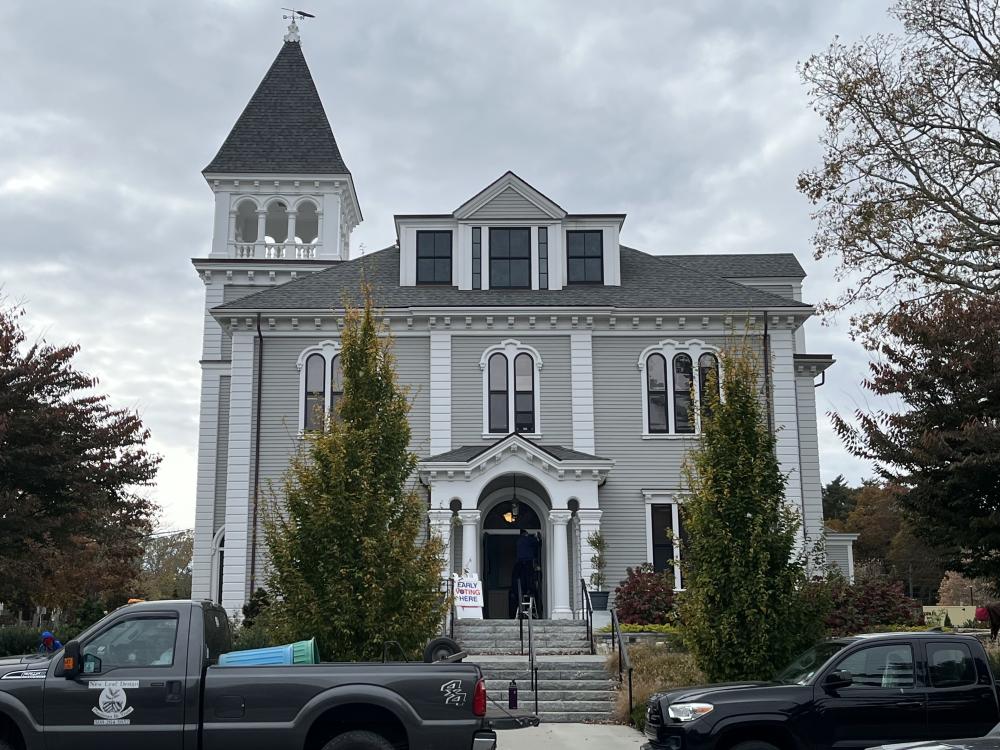Marion Town Meeting to discuss historic district, road repairs and more
MARION — Voters will consider the creation of a Marion Village historic district, a nearly $3.3 million renovation of the Town House and a proposal to remove the town from the Green Communities Program, along with several other proposals, at the Monday, May 12 annual Town Meeting at 6:45 p.m. in the Sippican Elementary School auditorium.
All of Marion’s registered voters are eligible to attend, participate and vote.
The town’s total operating budget for 2025 is $28,837,711. Meeting attendees will consider spending over $5 million on construction and renovation projects, including the following two proposals:
Town House Renovations. The potential renovation of the Marion Town House will be voted on at Town Meeting. If approved, this proposal would appropriate almost $3.3 million to be used for accessibility improvements, a fire suppression system and updating HVAC systems.
Due to rising costs of construction and current lack of building code compliance, Building Commissioner Bob Grillo said these renovations should be a top priority.
Fire Chief Brian Jackvony said that if the town does not vote to approve these renovations, he will have to submit an order of non-compliance to the state, forcing the town to submit a detailed timeline of the future construction plans within 30 days.
The potential funding will come from $300,000 worth of free cash and almost $3 million from borrowed funds.
The Finance Committee does not recommend this proposal, but the Select Board recommended the renovations in a 2-1 vote.
Road and sidewalk repairs. Voters will decide if the town will appropriate $300,000 worth of free cash to fund an accelerated pavement and sidewalk management plan, with approximately $50,000 from these funds going toward repairs over a five year period.
A citizens’ petition will also be voted upon that would appropriate $2.7 million to be used “as a first priority” for repairs of sidewalks, roads and ways.
TJ Walker, creator of the citizens’ petition, said that the proposal “will ensure public safety and benefit the greatest number of residents and visitors.”
He stated that the town must prioritize the roads and sidewalks because they are “in a serious state of disrepair and will only get worse.”
Town Administrator Geoffrey Gorman said that all of the road and sidewalk repairs “cannot be addressed in one budget cycle” and that the issue needs to be addressed over time.
Stretch Energy Code. In addition to repairs and renovations, voters will also decide if Marion will leave the Green Communities Program and remove the Massachusetts Stretch Energy Code from the Marion bylaws.
Towns that adopt the Stretch Energy Code must meet specific energy efficient demands for constructing low-rise residential and commercial buildings, including new building additions over 1,000 feet and renovations that are more than 50% of the home and exceed 1,000 feet.
New construction and renovations that apply to the code have certain requirements to meet, including installation of enhanced insulation. The construction of “mixed-fuel” households that use fossil fuels must also install renewable energy sources to offset energy use.
The Select Board recommended that the town delete the section of the Marion bylaw containing the Stretch Energy Code in a 2-1 vote.
Historic District. The town is proposing the creation of a historic district in Marion, which would include all of Cottage Street, Hiller Street, Main Street, Pie Alley, School Street, South Street, Water Street, #1-9 Allen Street, #137-183 Front Street, #1-2 Island Wharf Road, #2-10 Lewis Street, #61-78 Pleasant Street and #8-16 Spring Street.
The district would exclude two commercial business properties that were deemed to have insignificant historic value.
Property owners would have to abide by guidelines for exterior construction, additions, new construction and demolition to preserve Marion’s historic buildings.
William Tifft, chair of the Marion Historic District Study Committee, said the proposed district would benefit all Marion residents by preserving the town’s historic character.
Accessory Dwelling Units. Regulations on accessory dwelling units and short term rentals will be voted upon at Town Meeting.
The allowance of accessory dwelling units, which are smaller secondary living structures that accompany a principle building, is meant to increase housing in Massachusetts.
Under the proposed bylaw, accessory dwelling units must be smaller than half the floor area of the principle building or 1,200 feet, whichever is smaller.
The units must also include a separate entrance from the principal residence and one off-street parking space, unless the property owner receives exemption from the Zoning Board of Appeals.
They must also comply with all federal, state and local regulations for single-family homes.
In addition to these requirements, a property owner can only have one accessory dwelling unit on a given lot and short term rentals will not be permitted, with the minimum leasing period having to be greater than 31 days.
Tri-town math curriculum. The town is proposing the transfer or appropriation of $70,000 from available treasury funds to implement a consolidated three-year educational curriculum that would standardize math studies across the Tri-Town.
The Select Board and Finance Committee recommend this proposal.
Harbormaster removal from Police Department. A citizens’ petition proposes the removal of the Harbormaster from the Police Department, placing the department under the authority of the Town Manager.
Select Board member Toby Burr created the petition, stating that it would be cheaper to run the Harbormaster Department under the town rather than the police department due to the increased salaries and benefits of Police Department employees.
“It is not a law enforcement job. It’s a job to seek compromise and talk and listen and so that’s a very different outlook than a police department,” he said.
Vincent Malkoski, chair of the Marine Resource Commission, said that no one spoke to the Commission in advance of this petition being filed, and he does not see the benefit of placing the Harbormaster under the authority of the town.














